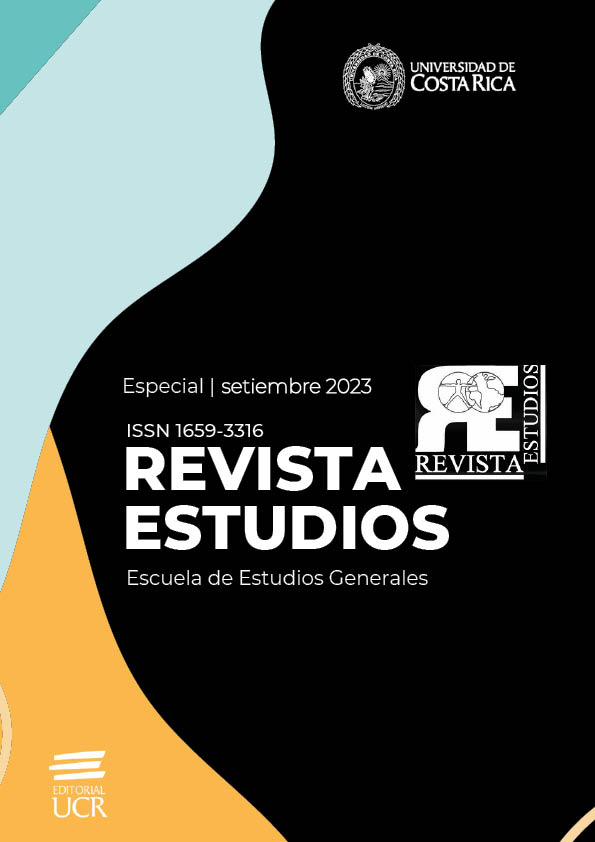Resumen
El artículo analiza el tópico de la militia amoris bajo sus variantes del amor como una guerra, el amor frente a la guerra y el triunfo del amor. Se trabaja con un corpus de 29 pasajes, extraídos de la poesía amorosa acadia (La amante fiel, ca. 2000-1500 a.e.c.), la elegía amorosa latina (Elegías de Tibulo, Elegías de Propercio, Amores de Ovidio; ca. 50-1 a.e.c.) y la lírica amorosa sánscrita (Centuria de amor de Bhartṛhari, ca. s. IV e.c.; Cien poemas de amor de Amaru, ca. s. VII e.c.; Los cincuenta poemas del amor furtivo de Bilhaṇa, ca. s. XI e.c.). En conclusión, se propone la posibilidad de una influencia acadia en la versión grecolatina del tópico, así como la posibilidad de una subsecuente influencia de la última en la poesía amorosa en lengua sánscrita.
Citas
Arora, U. P. (2011). India and the Hellenistic world. En K. Savvopoulos (Ed.), Second Hellenistic studies workshop (pp. 45-65). Alexandria Center for Hellenistic Studies.
Bachelard, G. (1966). La philosophie du “non”: Essai d’une philosophie du nouvel esprit scientifique (4e ed.). Les Presses Universitaires de France.
Bailey, G. (Trad.); Gombrich, R. (Trad.). (2005). Amaru & Bhartṛhari; Bilhaṇa, Love lyrics. Clay Sanskrit Library.
Bernabé, A. (1995). Influences orientales dans la littérature grecque: Quelques réflexions de méthode. Kernos: Revue internationale et pluridisciplinaire de religion grecque antique, 8, 9-22.
Black, J., George, A., & Postgate, N. (2000). A concise dictionary of Akkadian (2nd repr.). Harrassowitz Verlag.
Bronkhorst, J. (2016). How the brahmins won: From Alexander to the Guptas. Brill. https://doi.org/10.1163/9789004315518
Burkert, W. (1983). Itinerant diviners and magicians: A neglected element ln cultural contacts. En R. Hägg (Ed.), The Greek renaissance of the eighth Century B.C., tradition and innovation: Proceedings of the second international symposium at the Swedish institute in Athens, 1-5 Jun, 1981 (pp. 115-120). Aströms.
Burkert, W. (1992). The Orientalizing revolution: Near eastern influence on Greek culture in the early archaic age. M. E. Pinder (Trad.). Harvard University Press.
Butler, H. E. (Trad.). (1916). Propertius, Elegies. Loeb.
Cornish, F. W. (Trad.); Postgate, J. P. (Trad.); Mackail, J. W. (Trad.). (1921). Catullus; Tibullus; Pervigilium Veneris. Loeb.
Cristóbal López, V. (Trad.). (1989). Ovidio, Amores; Arte de amar; Sobre la cosmética del rostro femenino; Remedios contra el amor. Gredos.
De Angelis, F. (Ed.). (2020). A companion to Greeks across the ancient world. Wiley-Blackwell.
Devadhar, C. R. (Trad.). (1984). Amaruka, Amaruśatakam. Motilal Banarsidass.
Drinkwater, M. O. (2013). Militia amoris: Fighting in love’s army. In T. S. Thorsen (Ed.), The Cambridge companion to Latin love elegy (pp. 194-206). Cambridge University Press. https://doi.org/10.1017/CCO9781139028288
Gale, M. R. (1997). Propertius 2.7: Militia amoris and the ironies of elegy. The Journal of Roman Studies, 87, 77-91.
Hiltebeitel, A. (2018). Freud’s Mahābhārata. Oxford University Press.
Hunter, R. (2013). Greek elegy. In T. S. Thorsen (Ed.), The Cambridge companion to Latin love elegy (pp. 23-38). Cambridge University Press. https://doi.org/10.1017/CCO9781139028288
Lakoff, G. & Johnson, M. (1980). Metaphors we live by. The Chicago University Press.
Leick, G. (1994). Sex and eroticism in Mesopotamian literature. Routledge.
Lenzi, A. (2019). An introduction to Akkadian literature: Contexts and content. Eisenbrauns.
Lévi, S. (1963). Le théâtre indien, tome 1er. Honoré Champion. (Trabajo original publicado en 1890).
López Férez, J. A. (Ed.). (1988). Historia de la literatura griega. Cátedra.
Luján, E. R. (Trad.). (2005). Bhartṛhari, Centuria de amor. Akal.
Monier-Williams, M. (1899). A Sanskrit-English dictionary, etymologically and philologically arranged with special reference to cognate Indo-European languages. Oxford University Press.
Murgatroyd, P. (1975). “Militia amoris” and the Roman elegists. Latomus, 34(1), 59-79.
Mylius, K. (2015). Historia de la literatura india antigua (D. Pascual Coello, Trad.). Trotta.
Nehru, L. (1989). Origins of the Gandhāran style: A study of contributory influences. Oxford University Press.
Nissinen, M. (2016). Akkadian love poetry and the Song of Songs: A case of cultural interaction. In L. Hiepel & M. T. Wacker (Eds.), Zwischen Zion und Zaphon: Studien im Gedenken an den Theologen Oswald Loretz (14.01.1928-12.04.2014) (pp. 145-170). Ugarit-Verlag.
Pichon, R. (1991). Index verborum amatorium. Georg Olms Verlag. (Trabajo original publicado en 1902).
Pingree, D. (1971). On the Greek origin of the Indian planetary model employing a double epicycle. Journal for the History of Astronomy, 2, 80-85.
Pujol, Ó. (Trad.). (1995). Bilhana, Los cincuenta poemas del amor furtivo. Hiperión.
Ramírez de Verguer, A. (Trad.). (1989). Propercio, Elegías. Gredos.
Real Academia Española. (s.f.). Conquistar. En Diccionario de la lengua española. https://dle.rae.es/conquistar?m=form
Rodríguez Adrados, F. (1987). Historia de la fábula greco-latina. Editorial de la Universidad Complutense.
Showerman, G. (Trad.). (1914). Ovid, Heroides and Amores. Loeb.
Soler Ruiz, A. (Trad.). (1993). Catulo, Poemas; Tibulo, Elegías. Gredos.
Streck, M. P. & Wasserman, N. (s.f.). Love literature. In M. P. Streck & N. Wasserman (Eds.), Sources of early Akkadian literature: A text corpus of Babylonian and Assyrian literary texts from the 3rd and 2nd millennia BCE. https://seal.huji.ac.il/taxonomy/term/73?sort_by=title&sort_order=ASC&page=0
Thorsen. T. S. (Ed.). (2013). The Cambridge companion to Latin love elegy. Cambridge University Press. https://doi.org/10.1017/CCO9781139028288
Tola, F. (Trad.). (1971). Amaru, Cien poemas de amor. Barral Editores.
West, M. L. (1997). The east face of Helicon: West Asiatic elements in Greek poetry and myth. Clarendon Press.
Windisch, E. (1882). Der griechische Einfluss im indischen Drama. A. Asher.
Wulff Alonso, F. (2008). Grecia en la India: El repertorio griego del Mahabharata. Akal.
Wulff Alonso, F. (2019). Book 4 of the Mahābhārata and the Omphale-Heracles story: Methodological questions. In R. P. Goldman & J. Hegarty (Eds.), Proceedings of the 17th world Sanskrit conference: Section 4 epics. University of British Columbia.
Wulff Alonso, F. (2022). Los períodos de formación del pensamiento indio: Notas no esencialistas. Revista de Filosofía de la Universidad de Costa Rica, 41(160), 105-118.
##plugins.facebook.comentarios##

Esta obra está bajo una licencia internacional Creative Commons Atribución-NoComercial-CompartirIgual 4.0.
Derechos de autor 2023 Roberto Morales Harley


